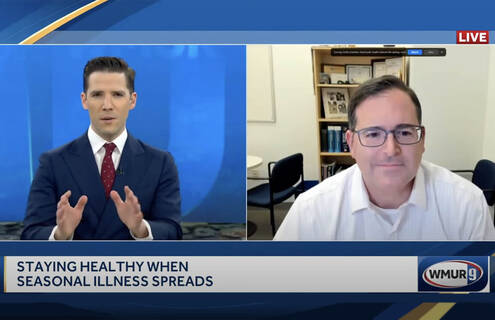
Health officials in New Hampshire say they are seeing high numbers of respiratory illnesses in the state.
In an interview with WMUR’s Steve Bottari, Dartmouth Hitchcock Medical Center Chief Quality Officer Michael S. Calderwood, MD, MPH, answered viewer questions about how to fight the surge in illnesses.
Here are his 6 tips for getting healthy this winter and beyond.
What is the best way to stay hydrated when you have the stomach bug?
The most important thing is keeping up with water. If you’re having diarrhea and vomiting, you may need to replace electrolytes. Pedialyte can be very helpful and you can get that at CVS and other pharmacies.
Is it okay to exercise if you have a cold but not a fever?
You want to be thinking about how you might be putting others at risk. If you’re talking about exercising at home, as long as you’re not overdoing it, that is perfectly fine. You don’t want to be going into a gym where you may be spreading infection to other people.
Have the new RSV vaccines and antibody shots made a difference in the number or severity of illnesses?
This season, we are seeing about a 20 percent increase in RSV (respiratory syncytial virus) cases. I would imagine that would have been much higher if we didn’t have as many people vaccinated, although we still have a large number of people who haven’t come forward to be vaccinated and who are eligible.
How can you tell if you have Norovirus or some other GI issue?
Norovirus tends to be pretty severe. You are actively vomiting and having diarrhea at the same time. It tends to go on for about 48 hours and then self-resolve. Norovirus is not your typical loose bowel movement. It is pretty violent.
How can you tell if you have flu, COVID-19, RSV or the virus we’re hearing about from China?
If I look back at the numbers, we actually have very low activity of COVID-19 right now. We’re very high for Influenza A. RSV seems to be going around. A number of viruses that cause a common cold, like Rhinovirus and other coronaviruses that don’t cause COVID-19, are on the rise. They’re all hitting at the same time.
It’s important to come in if you’re very sick because we have treatments for some of them. If you have really bad flu, we can give you Tamiflu and other medications. We can test. Sometimes, being tested can help us connect you with the right care.
What is another, maybe less talked about way to stay healthy mentally and physically throughout the year?
Focus on gratitude. Gratitude has positive effects on sleep quality, depression risks, and heart health, and findings published last July found that nurses with high gratitude scores had a nine percent lower risk of dying in the next four years.
Meditation and journaling can support a grateful mindset, too.
Lastly, remember, when we push ourselves to exhaustion, it is important to step back and ask what needs to change.